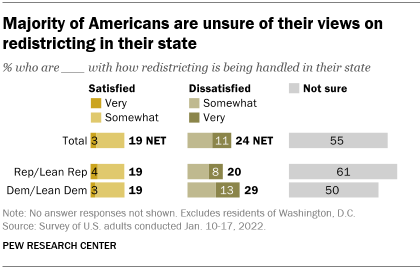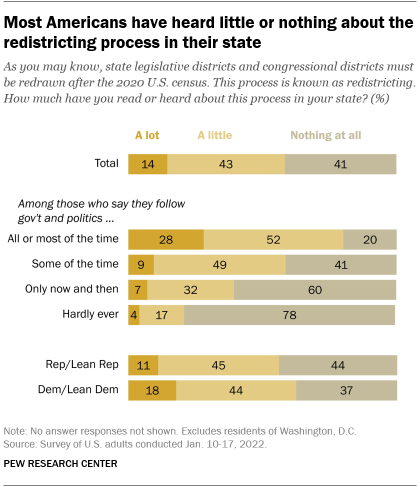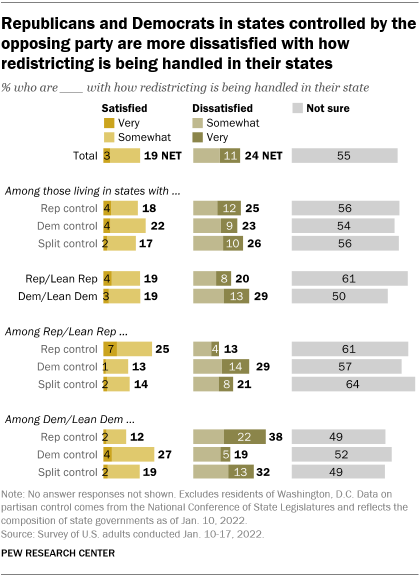The once-a-decade process of legislative redistricting is a topic of intense interest for both parties and scores of lawmakers whose jobs may be riding on the outcome. But when asked their view of how redistricting is being handled in their state, only a small share of Americans have heard a lot about it and a majority are not sure how they feel.
Just 14% of U.S. adults say they have heard a lot about the redistricting process in their state, according to a mid-January Pew Research Center survey. Overall, more than eight-in-ten Americans (85%) say they have heard a little or nothing at all about legislative redistricting in their state.
While somewhat more Americans are dissatisfied (24%) than satisfied (19%) with how redistricting is being handled, 55% say they are not sure.
As states work through the once-a-decade congressional redistricting process in advance of the 2022 midterm elections, this Pew Research Center survey looks at the public’s views of the process. To do so, 5,128 U.S. adults were surveyed Jan. 10-17, 2022. Everyone who took part is a member of the Center’s American Trends Panel (ATP), an online survey panel that is recruited through national, random sampling of residential addresses. This way nearly all U.S. adults have a chance of selection. The survey is weighted to be representative of the U.S. adult population by gender, race, ethnicity, partisan affiliation, education and other categories. Read more about the ATP’s methodology.
Here are the questions used for the report, along with responses, and its methodology.
Over the past several months, state legislatures and independent commissions have been busy drafting new legislative maps. As in the past, the process has turned contentious in many states – and has resulted in scores of lawsuits.
Every state has begun the redistricting process and most have approved their maps. Redistricting got off to a slow start with the delayed release of 2020 census data due to pandemic complications.
There are only modest partisan differences in views of redistricting: Democrats and Democratic leaners are more likely than Republicans and Republican leaners to have an opinion about the process in their state (48% vs. 39%), and Democrats on balance are more negative in their views of the process compared with Republicans.
Even among those who are generally attentive to political matters – the 32% of Americans who say they follow what is going on in government and politics most of the time – only 28% say they have read or heard a lot about the redistricting process.
For the minority of Americans who have some view – positive or negative – about the redistricting process, their attitudes vary by which party is in control of their state’s government.
Republicans living in states with unified Republican control of their states’ governments are substantially more positive about the process than those living in states controlled by Democrats or where power is split between the two parties. Still, the majority of Republicans, regardless of who is in control of their states’ governments, are indifferent about the process.
A similar dynamic is seen among Democrats. While the greatest share of Democrats have no opinion either way, those living in states with unified Democratic control are more positive on balance toward the process than those living in states with unified Republican control.
Note: Here are the questions used for the report, along with responses, and its methodology.



